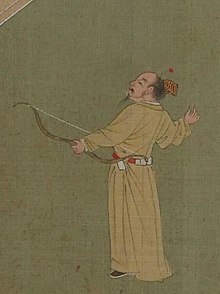| Wu Yi 武乙 | |||||||||
|---|---|---|---|---|---|---|---|---|---|
 | |||||||||
| Reign | 1147–1112 BC | ||||||||
| Predecessor | Geng Ding | ||||||||
| Successor | Wen Ding | ||||||||
| Died | 1112 BC | ||||||||
| Issue | Wen Ding | ||||||||
| |||||||||
Wu Yi (武乙), personal name Zi Qu (子瞿) was king of the Shang dynasty of ancient China from 1147 to 1112 BC. According to the Bamboo Annals, his capital was at Yin. He was a son of his predecessor Geng Ding and father of King Wen Ding.
In the 21st year of his reign, the Zhou leader Koufu (口父) died.
Records
According to the Bamboo Annals, in the 24th year of the regime of Wu Yi, Zhou attacked Cheng (程) at Bi (毕) and defeated Bi.
According to the Bamboo Annals, in the 30th year, Zhou attacked Yiqu (义渠) and captured the king of Yiqu. According to Sima Qian, the King of Yiqu has two sons by different mothers; after the king died, they fought each other for throne only to have Zhou defeat them both and absorb the territory of Yiqu.
In the 34th year of Wǔ Yǐ's reign, King Ji of Zhou came to the capital to worship and was rewarded with 30 pieces of jade and 10 horses.
In the 35th year of Wǔ Yǐ's reign, Ji attacked the Guirong (鬼戎) at Xiluo (西落). According to Sima Qian, he captured 20 kings of that tribe. In the same year, Wu Yi went hunting between the Yellow and Wei Rivers and was killed by lightning. According to the Book of Documents, this was blamed on Wu Yi's grave impiety. Wu Yi's death is still a mystery, Wu Yi may have been a reformer who wanted to separate church and state, priests as a retaliatory action scandalized his image and made a fabricated record that "Wu Yi was struck by lightning when he shot the sky". Some scholars speculate that Wu Yi died in battle or died of illness between the Wei River and Luoshui.

According to the Records of the Grand Historian, he was supposed to have carved a wooden statue(偶) of "the God of Heaven" and had one of the people to throw dice to represent it. He played liubo with the idol and if the idol lost the game, he humiliated it. Another time, he filled a leather bag with blood and hung it high in the air, then shot it with arrows; he called this "shooting Heaven".
References
- SHANG KINGSHIP AND SHANG KINSHIP
- The Cambridge History of Ancient China
- Bai, Shouyi (2002). An Outline History of China
- Bamboo Annals
- Sima Qian, Records of the Grand Historian
- Book of Documents
- "从武乙射天看商代的人神关系". www.doc88.com. Retrieved 3 May 2024.
- Religions of Ancient China Chapter I by Herbert Allen Giles
| Wu Yi of Shang Shang dynasty | ||
| Preceded byKang Ding | King of China c. 1147 – c. 1112 BC |
Succeeded byWen Wu Ding |
| Kings of the Shang dynasty | ||
|---|---|---|
| Predynastic Shang | 商 | |
| Early Shang | ||
| Late Shang | ||
| The term here refers to the period in the historiographical sense, starting from Pan Geng who is traditionally said to have moved the Shang capital to Yinxu. The same term can also refer to the historical polity as the earliest known literate civilization in China, starting from Wu Ding. Xia → Shang → Zhou → Qin → Han → 3 Kingdoms → Jìn / 16 Kingdoms → S. Dynasties / N. Dynasties → Sui → Tang → 5 Dynasties & 10 Kingdoms → Liao / Song / W. Xia / Jīn → Yuan → Ming → Qing → ROC / PRC | ||